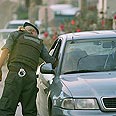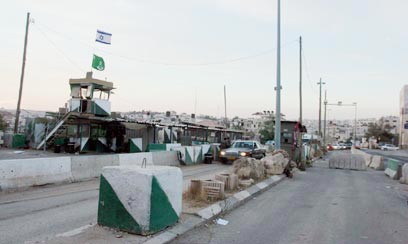
Aram checkpoint - easing of restrictions?
צילום: כיל יוחנן
Israel eases restrictions, expands checkpoints
New UN data shows that despite easing of restrictions, the number of checkpoints rose by 40 percent over the past year. "It's not just the number, it's mostly the abusive treatment towards Palestinians" says Machsom Watch
Every few months the government and the IDF declare "easing a series of restrictions". These steps are meant to make the lives of Palestinians, at least according to the Israeli media, certainly bearable.
In reality, the facts and figures prove that not only are restrictions not eased but that Palestinians face a significant rise in security crossings, checkpoints, roadblocks and stricter permit procedures.
According to the United Nations Office for the Coordination of Humanitarian Affairs in Jerusalem the past year has seen a 40 percent rise in the number of West Bank checkpoints, All in all, according to the bureau's figures, there are 528 checkpoints operating throughout the West Bank. All while stricter policies have been placed the authorization of crossing permits.
The organization also says that Palestinians deal not only with the permanent checkpoints but with temporary roadblocks, which Palestinians refer to as 'flying roadblocks', which can reach up to 155 a week throughout the region.
Naomi Lali and her friends at the Machsom Watch organization aren't surprised by the figures. Lalu says that to get from Nablus to Hebron travelers must go through nine permanent checkpoints and several temporary roadblocks, changing the usual 90 minute drive becomes a more than 24 hour nightmare.
Not the number of checkpoints, mostly the attitude
But Lalu is not only concerned with the number of checkpoints but also with the behavior of the soldiers manning them. She and her friends receive almost daily complaints from Palestinians who are detained for long hours at checkpoints. She says this month, despite the Ramadan, there has been no easement on restrictions. "In fact, the opposite is true," she says, "We received numerous testimonies of people who had no choice but to break the fast with only a sandwich at a checkpoint."
According to Lalu, in addition to the large number of checkpoints "the Palestinians are forced to undergo a 're-education' by the soldiers, who have decided this is necessary. Anyone who cries and shouts after spending hours at a checkpoint is punished and sometimes forced to return to the end of the line."

Aram checkpoint, "Palestinians are 're-educated'" says Machsom Watch
Lalu says that after Palestinians finally reach the head of the line they undergo a lengthy security check. "Soldiers, sometimes female soldiers, check the Palestinians. They are asked to take off their belt, shirt, roll up their sleeves, take off their shoes. All this takes a lot of time in addition to the hours the Palestinian waited to get to the head of the line." Even if there are 50 or 500 people at a certain checkpoint, the army doesn't bother to add another post to make it easier for people," she says.
According to the United Nations Office for the Coordination of Humanitarian Affairs, the Palestinian villages in the Jordan River Valley continue to suffer from severe isolation. Residents of Nablus aged 16-32 cannot leave the city at all, which forces them to infiltrate through other routes. If they are caught they receive punishments varying from confiscation of their ID's, being detained for questioning and at times even arrest.
Abu Aqram, a taxi driver from the area of Nablus, says that a five hour wait at a checkpoint is not out of the ordinary. "It mostly depends on the soldier's mood. Sometimes you see them playing around while blocking the checkpoint and saying that it's closed. You get the feeling that they're doing it just to aggravate people. The checkpoints are the father of all evil, they are the essence of the occupation – they humiliate and dominate our lives."
The previous report published by the office claims that fewer and fewer Palestinians receive permits to enter Israel. According to the report, the checkpoints isolate and cut-off communities from each other. "Restricting travel throughout the West Bank is the primary reason for the devastating economic situation afflicting Palestinians," the report says. For instance, the report writes, since December 2005 residents of Jenin are not allowed to travel south of Nablus. There checkpoint, the report says, damage family relations, make it difficult for merchants to market their goods and harm the ability of farmers to work their land.










